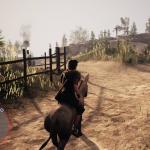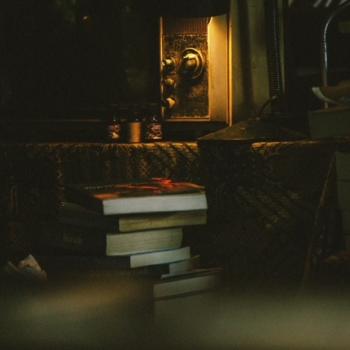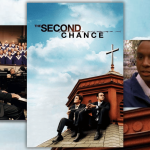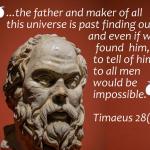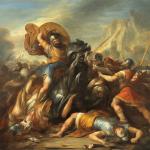
What happens after we die is one of the most intrinsic human questions that lives within the mind of every mortal who’s walked this earth. Endless theories about the afterlife and its existence have been posited throughout the ages in an attempt to quell our existential angst. But even with the defined dogmas and traditions within religious cultures and the definite denial in the atheist/materialist camps, we ultimately have almost no idea what happens when we die. It’s not something science can prove (or disprove), and even in the Christian scriptures, we see the afterlife described almost entirely in metaphoric images that leave even the most educated bible scholars scratching their heads. This ambiguity on something so central to our human experience can be frustrating, even scary. But it also leaves space for artists and writers to creatively utilize the absence of detail to speculate and to explore deep and meaningful questions about our existence, our purpose, and our deepest eternal desires.
Below is a list of fiction books from authors who have tackled the question of what happens when we die in a way that offers us some insight into what this burning question can tell us about ourselves, reality, and God.
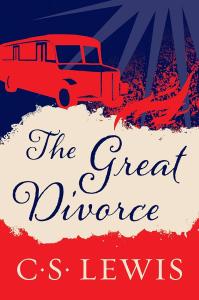
The Great Divorce by C.S. Lewis
Novelist, theologian, and one of the most influential Christian minds of the 20th century, C.S. Lewis, wrote a novel that brings an entirely different picture of hell and heaven and the afterlife than had been seen before. It’s a story about a man who encounters people in hell who aren’t there by force, but instead by choice, investigating why they choose not to take a ride on a daily bus that would take them to paradise.
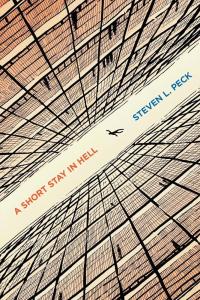
A Brief Stay in Hell by Steven L. Peck
This short and satirical book follows a religious man who, to his surprise, wakes up in hell. But the hell he finds himself in is very different from the conceptions he had come to believe on earth, which were informed by his religions teaching. The walls of this hell aren’t lined with fire and brimstone, but instead an almost infinitesimally large amount of books, of which only one, should he find it, would allow him to leave.

The Midnight Library by Matt Haig
This recent release is a bit less heavy in tone than some of the entries on this list. But that by no means makes it any less thought-provoking. The Midnight Library tells the story of a young woman who commits suicide and wakes up in an infinite library with a librarian who informs her that every book on the endless shelves is the story of her life, had she made one different choice. We follow her through multiple potential lives, causing the protagonist and reader to reflect on the importance of the choices we make with our limited time on earth.

The Inferno by Dante
Perhaps the most famous (or infamous) book on our list, The Inferno was written by Italian philosopher and poet Dante Alighieri. It is the first section, along with Purgatory and Paradise, of The Divine Comedy, where Dante writes himself into the epic poem that has him tour hell on Good Friday alongside his idol, the Roman poet Virgil. After passing the gates with the famous “Abandon Hope All Who Enter” inscription atop it, they proceed to visit the nine circles of hell, each with specific punishments for specific sins. This work, while a fictitious account, has impacted and defined modernity’s conception and theology of hell more than any other extra-biblical work and is where we get the term “poetic justice.”

The Five People You Meet in Heaven by Mitch Albom
This modern classic casts off the traditional visions of heaven and hell and imagines a wholly different experience after death. We follow the tale of an old man who feels as if he has lived a meaningless life and, after dying in a freak accident, discovers heaven is not a destination but instead a place where five people, both strangers and friends, explain your life to you. Equal parts charming, heartbreaking, and touching, this book offers us a different way to understand our lives and their ultimate impact and purpose.
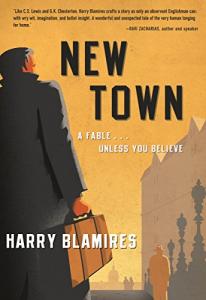
New Town by Harry Blamires
A largely unknown book written by a student and friend of C.S. Lewis, whose style impacted the writing of this fable. New Town follows a man who, upon dying, wakes up in a small town that on the surface seems lovely, but underneath its shiny facade, is decaying along with the people who live there. While exploring “Old Town” the man hears tales of the wonderful “New Town” and embarks on a journey to find the place where death no longer exists.
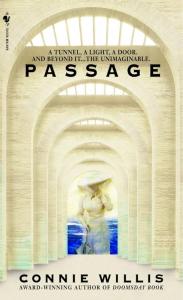
Passage by Connie Willis
This novel follows a research psychologist, Joanna, who studies near-death experiences. When she and her team discover a way to induce a near-death experience, she volunteers to be the test subject. After undergoing the process, she wakes up to what appears to be a long tunnel where she begins her journey through the afterlife.
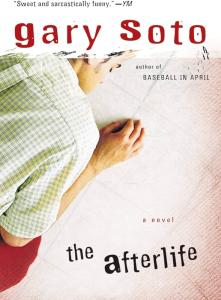
The Afterlife by Gary Sotto
A young adult novel following a Latin-American teen who dies after an attack and spends the rest of the story as a ghost exploring his local community, listening in to conversations about him from loved ones, and, in death, discovering lessons about life.

No Exit by John Paul Sarte
Technically a play, but a work of fiction nonetheless. No Exit was authored by existentialist philosopher Jean Paul Sarte, who writes a vision of hell where three people are punished by being locked in a room to talk to each other for eternity. This work is the origin of the famous saying, “Hell is other people.”
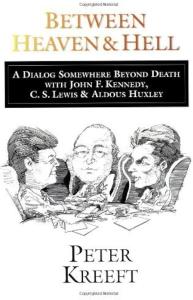
Between Heaven and Hell by Peter Kreeft
Modern Christian philosopher Peter Kreeft sets his book in the midst of a post-life conversation between three of the most influential minds of the 20th century: John F. Kennedy, Aldous Huxley, and C.S. Lewis, who all happened to die on the same day in 1963. In their conversations about life and God, we see the philosophies and values that made each so influential.


